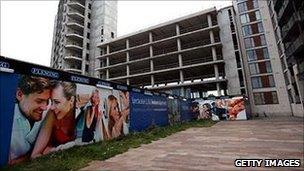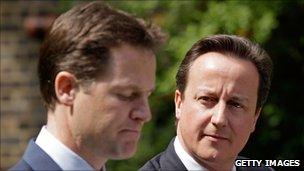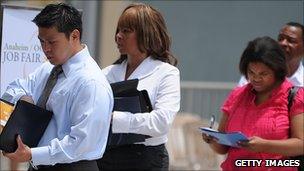The year in business: 2010
- Published

Over 600 estates lie unfinished across Ireland, where land is among the most expensive land in Europe
You have to go back four years to 2006, to find economic policymakers in the West in an upbeat, confident mood.
Since then they have been battered by waves, ranging from collapsing banks to frozen financial markets, culminating in 2009 with the first drop in world annual output since the 1930s depression.
During 2010 there has been a return to overall global growth.
But sceptics say the world's politicians are simply papering over the cracks, and the big fault lines in the global economy remain.
China's big trade surplus and fixed currency system appear to be unreformed, Americans continue to spend money they do not have, while in parts of Europe the situation is still worsening with the International Monetary Fund (IMF) being called in to provide emergency loans, first in May to Greece, and then to the Irish Republic.
Ghost towns
Supporters of the banking status quo insist that the complex multi-purpose banks and their financial derivatives trading desks are necessary to ensure that cash is invested in the most productive places in the world.
That particular argument wilts somewhat if you travel to Ireland.
While many parts of the world desperately need basic infrastructure, the Irish Republic simply has far too much of it. Vast so-called ghost estates built in the boom times now lie empty.
According to reporter Henry McKean, "Ireland won the lotto and everyone wanted a property portfolio".
Houses were built in isolated parts of the country.
"County Leitrim in North West Ireland has 21 ghost estates and an oversupply of 401%," Mr McKean says.
The money to fuel the Irish property boom came mostly from the banks. But were they solely responsible for the rush to build new homes across the Irish Republic?
Local councillor John McCarten believes others must share the blame.
"Councillors and planners are to blame, but you also have to acknowledge that there was blind greed on behalf of builders and landowners around the country," he says.
The blame game
Critics of Europe's single currency system say the euro was at least partly to blame.
Ireland was unable to dampen its property boom by setting its own interest rates because its rates are set by Europe's Central Bank, which has to consider conditions across 16 different nations.
Some wondered if the answer might be to allow the stronger euro economies to split from the weaker ones, allowing countries such as Ireland more economic freedom, while many in Germany became increasingly angry that they were footing much of the bill to rescue Ireland, as well as Greece which was bailed out earlier in the year.
But Germany's leader, Chancellor Angela Merkel, reiterated her commitment to the euro.
"If the euro fails, Europe fails. But if we avert this danger, the euro and Europe will come out stronger than before," she declared.

The UK coalition government announced a stringent budget to tackle the debt crisis
Even in the boom times, most governments in Western Europe spent more than they collected in taxes.
Now, after a severe recession, public finances everywhere are stretched and in the UK, a new Conservative-Liberal Democrat coalition government announced sharp spending cuts in the coming years.
The age of austerity had arrived.
Banking on reform
But what about reforming the system that produced the boom and bust?
The big banks were targeted by US President Barack Obama in January as he upped the rhetoric by announcing a new levy to claw back money from institutions which had been bailed out during the financial crisis.
"My commitment is to recover every single dime the American people are owed and my determination to achieve this goal is only heightened when I see reports of massive profits and obscene bonuses at some of the very firms who owe their continued existence to the American people," he said.
Then bank shares tumbled after President Obama turned for advice to the former US central bank boss, the 83-year-old Paul Volcker.
The President embraced Mr Volcker's view that banks holding cash deposits from ordinary Americans should be banned from so-called proprietary trading, where the banks take big bets in financial markets.
"I'm proposing a simple and common sense reform, which we're calling the Volcker rule," President Obama announced.
"Banks will no longer be allowed to own, invest or sponsor hedge funds, private equity funds or proprietary trading operations for their own profit, unrelated to serving their customers."
Some reform of the banks was eventually passed in Congress with the Dodd-Frank Wall Street Reform Act, although the Volcker rule was watered down.
So did the reforms go far enough?
Peter Morici at the University of Maryland thinks not and says that "until we separate the banks from the investment banks, so that banking is again banking, as opposed to trading, the banks are going to be much more interested in trading than banking, simply because they can make a lot more money that way.
"Goldman Sachs is not interested in America, Goldman Sachs is interested in Goldman Sachs."
But Goldman Sachs has clever people and are doing very clever things and at the end of the year, they make a profit. So what is wrong with that?
"Well, they did clever enough things to thrust the entire global economy into the great abyss," says Mr Morici.
"Bank of America and Morgan Stanley made profits every day on trading in the last quarter - they didn't have a negative day," he says.
"Unless you think traders are perfect there is something wrong with the information that they are getting," he maintains.
However, when somebody gains, somebody else is losing.
"Americans are losing. The ordinary stock holder is losing. They are not creating wealth on Wall Street, they are trading on it," Mr Morici asserts.
"If you are looking for aristocrats that should be beheaded, they are probably on Wall Street, though I wouldn't do it using a guillotine, I'd just take their toys away."
Chinese conundrum
America has lost many manufacturing jobs and the US unemployment rate is still nearly 10%.
Mr Morici is pretty angry about that too. "Certainly, there are things that China should be exporting to the US because of its cheap labour," he says.
He believes, however, that it would not be cost effective to make certain things in China, but for the fact that its currency is 40% undervalued.
"The idea behind free trade is that it be in two directions so that we each get to specialise in what we do best and we grow from there," he says.
"But China is exporting products where it has a comparative advantage and protecting those where it doesn't."
He points out that China has enough surplus labour to replace all the manufacturing workers in Europe, the US, Australia, New Zealand and Mexico.
"Do we really want to live in a world where everything is made in China and the rest of us just borrow money from the Chinese?" he asks.
Jim O'Neill from Goldman Sachs has an alternative perspective.
He is not responsible for the company's trading tactics - his job is to forecast accurately and he has a great record of correctly predicting the rise of China and the rebound of the euro after earlier troubles.
Mr O'Neill says the US trade deficit with China is now falling sharply.
"The US current account deficit year-to-date is running about half what it was before the crisis and the Chinese trade surplus is not much more than 3% of GDP."
He believes, however, that due to the rather emotional atmosphere in Washington, such data seems to be completely ignored by Congress.
"It is slightly scary because they are talking about things which are a little bit out of date," he says.

Job losses in the US have included white collar workers as well manufacturing positions
"I've come across people that quite bizarrely - in my judgement - blame China for the loss of every manufacturing job in the United States in the past 20 years and that is ridiculous," he says.
"If you look at some of the big companies that have grown so strongly in the US in the past 20 years, a lot of it has been because of the ability of the US to import from China - WalMart being a particularly good example," he explains.
"The unemployment situation linked to the US economic cycle, and the weakness of the past two years, is very severe and of course it is understandable that not only US politicians, but also workers, blame other people - and China seems to be a convenient scapegoat," he says.
There is also criticism that job losses have gone too far in America because the Chinese currency is not at a fair "market clearing" value, but Mr O'Neil has no sympathy with that viewpont.
"The Chinese currency has risen by over 20% the past five years. Chinese import growth is rising at over 40% - in the year to date, Chinese import growth has been close to $400bn.
Many people would argue that such figures are mainly due to the import of raw materials.
"No it is not," says Mr O'Neil.
"Look at countries that are really good at exporting, like Germany.
Some of Germany's top companies are employing people on overtime purely because of exports to China."
He points out how many branded goods companies around the world, Louis Vuitton being a particularly good example, are literally being transformed by the strength of Chinese demand and Chinese imports.
Eternal hope
The spotlight was diverted from the big banks for a while when an explosion at a BP oil rig in the Gulf of Mexico led to 11 deaths and created the biggest offshore oil spill in US history.
BP set aside $40bn to cover the cost.
Google had its own issues with Beijing - this time over censorship. It moved its China web search to its Hong Kong site in March.
And the hopes of the US seed firm Monsanto to introduce genetically modified crops into India were dashed, when the Indian government blocked the plan after protests from environmental groups and some scientists.
The US stock market overall rose around 10% in the past year, although historically American share prices have made no overall gains at all in the past 11 years.
By contrast, gold has soared over that period, leaping from $300 an ounce to $1,400, with this year's rise for gold being 25%.
There is always money to be made somewhere in the global economy.
- Published24 December 2010